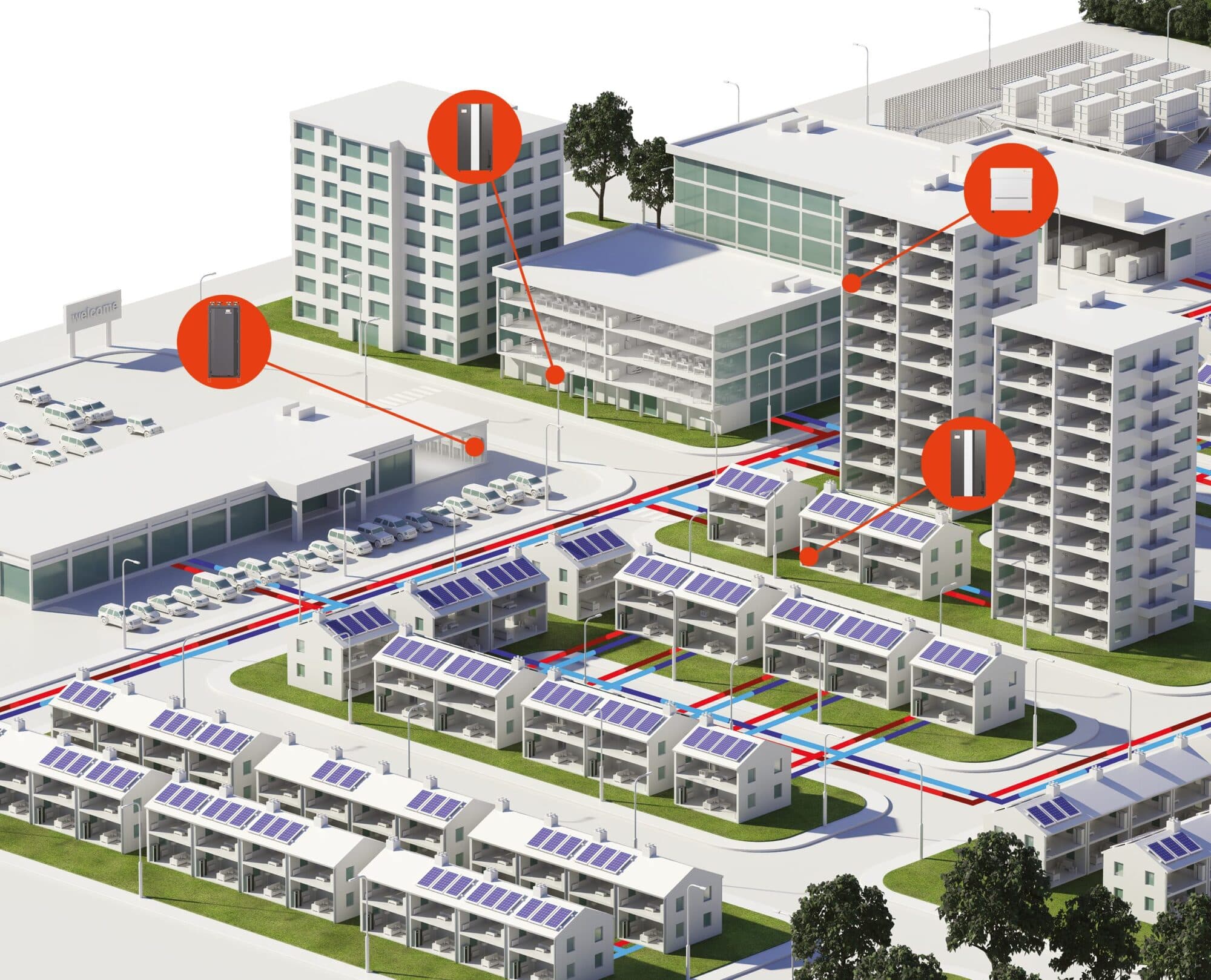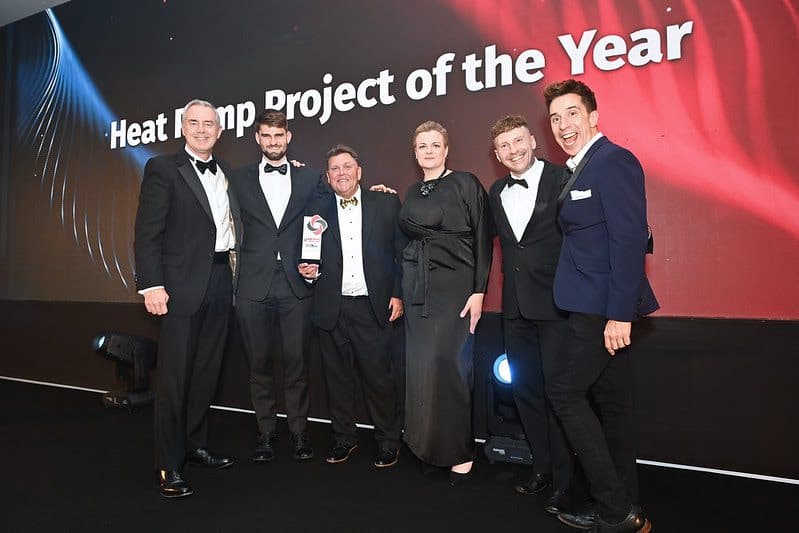Ground source specialist, Kensa, is delighted to be supporting four feasibility studies into high-density heat pump deployment across different parts of the UK as part of BEIS’ Heat Pump Ready Programme Stream 1.
Addressing the challenges raised in the UK Government’s 10-point plan and the Heating and Buildings Strategy to decarbonise heat by 2050 requires heat pumps to reach a scale of install exceeding 600,000 a year by 2028.
Kensa has long pioneered the installation of ground source heat pump technology connected to Shared Ground Loop Arrays and Ambient Heat Networks as a solution to this challenge of scaling up.
Whilst this is not a new concept and smaller Networked Heat Pumps systems have been installed successfully, so far this is still not a mainstream solution. The Heat Pump Ready projects will focus efforts on street-by-street installations, demonstrating a tangible pathway for a rapid transition to renewable energy.
BEIS has announced that Heat Pump Ready Programme Stream 1 has awarded a total of £2,055,202.43 to 11 projects across Great Britain as part of its £1 billion Net Zero Innovation Portfolio (NZIP), which aims to accelerate the commercialisation of innovative clean energy technologies and processes through the 2020s and 2030s.
Kensa will be working together with teams of skilled partner organisations from across local authorities, energy companies, finance, community energy, academia, and top-tier consultancies to develop feasibility plans for four innovative community heat pump solutions in Leeds, Greenwich, Teignbridge, and Bridgend.
Leeds is Leading the Charge for Widescale Heat Pump Deployment
Leeds City Council is leading a partnership of expert organisations in carrying out a feasibility study into the development of an innovative methodology for deploying domestic heat pumps at a high-density within urban communities, in line with the UK Government’s ambition of installing 600,000 heat pumps a year by 2028.
In 2021, approximately 85% of UK domestic heating was provided through networked gas. This is not compatible with a net zero future and the way we heat our homes has to change dramatically. Heat pumps produce no carbon emissions or harmful air pollution. Achieving their rapid installation in domestic homes on a mass scale is a technical, logistical, financial and social challenge that the project aims to tackle.
The Renewable Heat Infrastructure Network Operating System (RHINOS) project is part of the Heat Pump Ready Programme Stream 1, Phase 1, funded by BEIS through its £1 billion Net Zero Innovation Portfolio (NZIP), which aims to accelerate the commercialisation of innovative clean energy technologies and processes through the 2020s and 2030s.
Phase 1 of Stream 1 is a paid £200k feasibility study to support their application into Phase 2, which if successful would see the trial of their innovative methodology as part of a project up to £9m. The Heat Pump Ready projects will focus on street-by-street installations of heat pump technology in high-density urban areas, like Leeds, in an effort to demonstrate a tangible pathway for a rapid transition to renewable energy that can be rolled out across other areas of the UK.
Leeds City Council is committed to making Leeds carbon neutral by 2030 through building sustainable infrastructure, helping residents reduce their carbon footprints and reducing the levels of greenhouse gas emissions from buildings in the city. The RHINOS Project will bring together the very best partners to explore and create the conditions that will enable the council to deliver on its strong commitment to decarbonization.
The partnership, led by Leeds City Council, consists of Arup, Kensa Contracting Ltd, Parity Projects, University of Leeds, Leeds Sustainability Institute, Otley Energy, Legal & General, Northern Powergrid, and IRT Survey Ltd. The aim of bringing all these organisations together is to develop and strengthen partnerships between all stakeholders, several of whom are already involved in cutting-edge retrofit project developments in Leeds, to provide innovative solutions to aid the heat decarbonisation transition.
Low-carbon projects are often demonstrated in social housing, the result being rows of renovated properties broken up by private households that weren’t able to take part. The area selected in the city of Leeds for the potential deployment of heat pumps are private homes currently on the gas network and made up of a wide range of house types, including a large number of older and densely-packed Victorian terraced properties.
Councillor Helen Hayden, Leeds City Council executive member for Infrastructure and Climate said:
I’m delighted that this innovative project is happening here in Leeds. Heating and powering our homes produces roughly a quarter of the city’s carbon footprint, so anything that we can do to warm our homes in a better and greener way will make a big difference.
Leeds is already enjoying the benefits of low carbon heat pumps in dozens of our schools and council buildings and therefore it is fantastic that this project aims to help unleash this technology in our urban communities too.
With global gas prices continuing to rise and the planet heating up, projects like this one have never felt more important.
James Standley, COO of Kensa, said:
It is a very exciting opportunity to have some of the best possible stakeholders join together to develop viable methodology for high density, domestic, heat pump deployment that is replicable across the UK to deliver Net Zero Carbon heat.
Over the next few years, heat pumps will completely change how we heat our homes, but how do we approach the market who have been using networked gas for generations to engage them with a new solution? Our aim is to understand the needs of consumers within Leeds and to enable consumers to be offered the appropriate value propositions and customer journey to enable trialling of the most viable solutions.
Mark Neller, UKIMEA Energy Leader at Arup, said:
We are very pleased to be continuing our work supporting the decarbonisation of the housing in Leeds by bringing together and strengthening collaboration between the key partners and stakeholders as part of this exciting project focused on high-density domestic heat pump roll-out.
Arup brings holistic engineering consulting expertise plus long-standing relationships with Leeds City Council and the other project contributors. Collectively, we aim to address the key challenges and promote as many of the benefits of a coordinated approach as possible whilst developing evidence-based and replicable solutions for scaled-up heat pump deployment.
Team of experts lead ground-breaking Greenwich ground source heat pump study
A team of experts has launched a pioneering project in the Royal Borough of Greenwich to assess the feasibility of switching gas-heated, owned-occupied homes in high density areas to low carbon heating in the form of networked ground source heat pumps.
The aim is to develop an innovative methodology for the coordination of high-density heat pump deployment which will support urban communities switching to a low carbon technology that will reduce energy demand, improve air quality and mitigate against rising energy costs. The work supports Royal Borough of Greenwich Council’s carbon neutral plan to reach net zero carbon emissions in 2030.
The Greenwich Thermal Infrastructure Motivating Electrification (Greenwich TIME) project is funded under Heat Pump Ready Programme Stream 1, Phase 1, which is part of the BEIS £1 billion Net Zero Innovation Portfolio (NZIP), which aims to accelerate the commercialisation of innovative clean energy technologies and processes through the 2020s and 2030s.
The partners include: Element Energy, Kensa Contracting, Nationwide Building Society, UKPN, OVO Energy, Heat Geek and DG Cities.
Networked ground source heat pumps have been identified as the technology Greenwich will use to trial their innovative methodology, if the project be successful in Phase 2 of the programme. Networked ground source heat pumps have the potential to provide the lowest cost, lowest carbon decarbonisation pathway in a majority of situations, especially in high density urban areas, where the model allows whole streets to rapidly switch to low carbon heating technology.
The key barrier in adopting the technology has traditionally been the cost of installing underground infrastructure needed to extract renewable heat from the ground. The Greenwich project will explore the potential to decouple the up-front capital cost barrier of the ground side installation from customers via financing mechanisms similar to how existing domestic services (such as gas and electricity) are already funded.
The Greenwich TIME project aims to enable consumers to replace their boiler with a networked heat pump in a way that is affordable and simple to understand and adopt and completed, with minimal household disruption. This can be used as a blueprint for the deployment of heat pumps at scale within other urban communities across the UK - in line with Government targets to have 600,000 heat pumps installed per year by 2028.
Trevor Dorling, Managing Director of DG Cities, said:
We know from our previous research that there are many hurdles to the widespread adoption of heat pumps. In our recent survey, 70% of people said they were ‘highly unlikely’ to buy one in the coming year. We’re looking forward to working with Greenwich residents to understand, in greater depth, exactly why this is. Our focus will be making sure our heat pump offering is innovative, builds confidence in the technology and reduces the barriers to adoption, including reducing upfront costs to households. We’re part of a great team of project partners, and can’t wait to get started in the borough.
Sam Foster, Partner at Element Energy, said:
Achieving widespread rollout of heat pumps in homes up and down the country is key to the UK reaching net zero. The Government’s Electrification of Heat project has recently demonstrated that heat pumps are technically compatible with essentially all housing types. The key challenge is now to engage households and bring together the delivery partners – including equipment providers, installers, suppliers and finance – to make heat pumps attractive, affordable and convenient for all. We are delighted to be working with a brilliant team on the TIME project to develop and test innovative approaches to encourage and enable a heat pump community in the heart of Greenwich.
James Standley, COO at Kensa, said:
We are very excited to be involved in this study of a potential community-scale urban ground source heat pump solution for decarbonising the nations’ heating. Kensa believes that the combination of low carbon technology and renewable infrastructure proposed in Greenwich is a key contender for the lowest system cost route to achieving net zero in the UK, and we are therefore keen to work with the project partners to explore the proposals.
Alex Thwaites, Head of Zero Carbon Living, OVO:
We’re committed to supporting households across the UK to decarbonise their homes, moving the UK further away from reliance on fossil fuels. This project helps us to develop innovative propositions and offerings to support customers living in high density areas, ensuring they don’t get left behind in the energy transition. By working together with the project’s partners we can drive the technological solutions to move us towards zero carbon living.
Patrick Wheeler, Owner & Director, Heat Geek, said:
We work with both consumers who are interested in adopting low carbon technologies and forward-facing installers who want to be at the forefront of the heating revolution installing them. There is an exponentially growing demand from both sides of the industry and both with their individual and unique barriers, these will take hard work and collaboration and we firmly believe that heat pumps will have their zeitgeist moment very soon. We are happy and grateful to be a part of a wider group with a mutual goal to address the skill gap and find solutions to promote the uptake of heat pumps in our journey towards a net carbon zero future.
Bridgend
The consortium consists of Bridgend County Borough Council, Kensa, Buro Happold, Challoch Energy, and Nuvision Energy Wales. The project within the Bridgend County Borough, which is part of the Heat Pump Ready Programme, aims to demonstrate how the deployment of heat pumps at scale will help with the decarbonisation of heat, propelling the UK forward to achieve net zero targets. Adopters of ground source technology in the community will show how Wales and the rest of the UK can follow suit in the transition to a low-carbon heating future.
Teignbridge
Part of the challenge with these projects will be developing compelling offerings to the complex networks of stakeholders in each location and engaging them with the benefits of ground source heat pumps and a different solution to the problem of decarbonization.
Part of the challenge with these projects will be developing compelling offerings to the complex networks of stakeholders in each location and engaging them with the benefits of ground source heat pumps and a different solution to the problem of decarbonization.
Ieman Barmaki, Sustainability Director at Kensa, said:
We’re excited to be working with the very best partners on these community-wide heat pump solutions which have the potential to change the way we heat our homes here in the UK.
Together we are trying to break down the perceived barriers to the widescale electrification of heat and showcase to policymakers and the public that Networked Heat Pumps can achieve mass decarbonization goals at scale for the lowest economic and societal cost.


